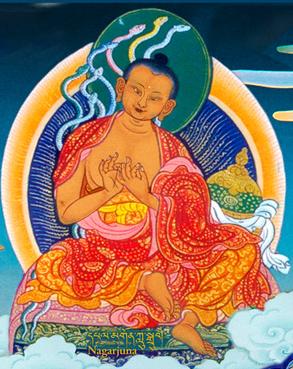Arya Nargarjuna
Mulamadhyamaka-karikas
Fundamentals of the Central Philosophy of Buddhism
 Section 25: An Analysis of Nirvana
Section 25: An Analysis of Nirvana
XXV.1.
If all existence is empty, there is no origination nor destruction.
Then whose nirvana through elimination of suffering and destruction of illusion would be postulated?
XXV.2.
If all existence is non-empty, there is no origination nor destruction.
Then whose nirvana through elimination of suffering and destruction of illusion would be postulated?
XXV.3.
Nirvana has been said to be neither eliminated nor attained, neither annihilated nor eternal,
Neither disappeared nor originated.
XXV.4.
Nirvana is certainly not an existing thing, for then it would be characterized by old age and death. In consequence it would involve the error that an existing thing would not become old and be without death.
XXV.5.
And if nirvana is an existing thing, nirvana would be a constructed product (samskrta),
Since never ever has an existing thing been found to be a non-constructed-product (asamskrta).
XXV.6.
But if nirvana is an existing thing, how could nirvana exist without dependence on something else?
Certainly nirvana does not exist as something without dependence.
XXV.7.
If nirvana is not an existing thing, will nirvana become a non-existing thing?
Wherever there is no existing thing, neither is there a non-existing thing.
XXV.8.
But if nirvana is a non-existing thing, how could nirvana exist without dependence on something else?
Certainly nirvana is not a non-existing thing, which exists without dependence.
XXV.9.
That state which is the rushing in and out of existence when dependent or conditioned—
This state, when not dependent or not conditioned, is seen to be nirvana.
XXV.10.
The teacher Gautama has taught that a “becoming” and a “non-becoming” (vibhava) are destroyed;
Therefore it obtains that: Nirvana is neither an existent thing nor a non-existent thing.
XXV.11.
If nirvana were both an existent and a non-existent thing,
Final release (moksa) would be both an existent and a non-existent thing; but that is not possible.
XXV.12.
If nirvana were both an existent and a non-existent thing,
There would be no nirvana without conditions, for these both operate with conditions.
XXV.13.
How can nirvana exist as both an existent thing and a non-existent thing,
For nirvana is a non-composite-product (asamskrta), while both an existent thing and a non-existent thing are composite products (samskrta).
XXV.14.
How can nirvana exist as both an existent and a non-existent thing?
There is no existence of both at one and the same place, as in the case of both darkness and light.
XXV.15.
The assertion: “Nirvana is neither an existent thing nor a non-existent thing”
Is proved if the assertion: “It is an existent thing and a non-existent thing” were proved.
XXV.16.
If nirvana is neither an existent thing nor a non-existent thing,
Who can really arrive at the assertion: “neither an existent thing nor a non-existent thing”?
XXV.17.
It is not expressed if the Glorious One the Buddha exists after his death,
Or does not exist, or both or neither.
XXV.18.
Also, it is not expressed if the Glorious One exists while remaining in the world,
Or does not exist, or both or neither.
XXV.19.
There is nothing whatever which differentiates the existence-in-flux (samsara) from nirvana;
And there is nothing whatever which differentiates nirvana from existence-in-flux.
XXV.20.
The extreme limit (koti) of nirvana is also the extreme limit of existence-in-flux;
There is not the slightest bit of difference between these two.
XXV.21.
The views regarding whether that which is beyond death is limited by a beginning or an end or some other alternative
Depend on a nirvana limited by a beginning (purvanta) and an end (aparanta),
XXV.22.
Since all dharmas are empty, what is finite ? What is infinite ?
What is both finite and infinite ? What is neither finite nor infinite ?
XXV.23.
Is there anything which is this or something else, which is permanent or impermanent,
Which is both permanent and impermanent, or which is neither ?
XXV.24.
The cessation of accepting everything as real is a salutary (siva) cessation of phenomenal development (prapanca);
No dharma anywhere has been taught by the Buddha of anything.
Source: Orientalia





